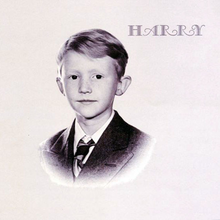| Harry | ||||
|---|---|---|---|---|
 | ||||
| Studio album by | ||||
| Released | August 1969 | |||
| Genre | Pop | |||
| Length | 40:57 | |||
| Label | RCA Victor | |||
| Producer | Harry Nilsson, Rick Jarrard | |||
| Harry Nilsson chronology | ||||
| ||||
| Singles from Harry | ||||
| ||||
| Review scores | |
|---|---|
| Source | Rating |
| AllMusic | |
| Robert Christgau | B+[2] |
| The Essential Rock Discography | 6/10[3] |
| MusicHound | 2.5/5[4] |
Harry is the fourth studio album by Harry Nilsson, released August 1969 on RCA. It was his first album to get onto Billboard Magazine's Billboard 200 chart, remaining there for 15 weeks and reaching #120.[5]
Harry features jazz saxophonist Tom Scott, pianist Mike Melvoin, flutist Jim Horn, session drummer Jim Gordon, Larry Knechtel on bass, and David Cohen and Howard Roberts on guitars.[5]
The album does not have a distinctive style but ranges over ballads, show tunes, nostalgic Americana, and tin pan alley-like soft shoe numbers.[1]
William E. Martin, who wrote the songs "Fairfax Rag" and "City Life" that Harry covered on Harry, and who collaborated with Nilsson on the song "Rainmaker," appears in a picture inside the gatefold version of the album wearing a bear suit that was made of an actual bear.[6]
- ^ a b Stephen Thomas Erlewine. "Harry - Harry Nilsson | Songs, Reviews, Credits, Awards". AllMusic. Retrieved 2014-06-25.
- ^ Christgau, Robert. "Harry Nilsson". Robert Christgau. Retrieved 2014-06-25.
- ^ Strong, Martin C. (2006). The Essential Rock Discography. Edinburgh, UK: Canongate. p. 758. ISBN 978-1-84195-827-9.
- ^ Graff, Gary; Durchholz, Daniel (eds) (1999). MusicHound Rock: The Essential Album Guide. Farmington Hills, MI: Visible Ink Press. p. 815. ISBN 1-57859-061-2.
- ^ a b [1] Archived June 16, 2008, at the Wayback Machine
- ^ Smith, Roger: liner notes, BMG re-release CD, 1999
